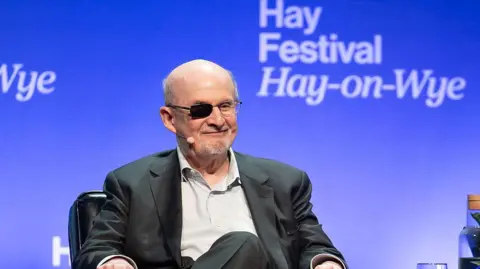In a recent public appearance at the Hay Festival, renowned author Sir Salman Rushdie expressed his determination to move forward from the traumatic knife attack he suffered in 2022. The incident, which occurred during a lecture in New York, left him with life-altering injuries but has not deterred his spirit. Rushdie stated, “I’m over it,” emphasizing his desire to return to discussions about literature rather than dwelling on the attack itself.
The assailant, Hadi Matar, a 27-year-old, was sentenced to 25 years in prison for attempted murder stemming from the assault on Rushdie. The attack was particularly shocking due to the long-standing controversies surrounding Rushdie’s work, especially his novel “The Satanic Verses,” which has been a flashpoint for discussions about free speech and religious sensitivities for decades. During the festival, Rushdie reflected on an “important moment” when he and his wife, Eliza, revisited the site of the attack. This act symbolized his resilience and determination to reclaim his personal narrative.
As he discussed his recovery, Rushdie acknowledged that while he suffered significant physical damage—such as losing sight in one eye and enduring other bodily injuries—he maintained an optimistic outlook. He humorously remarked on his condition, saying, “I can’t see everyone – but I can hear them,” which resonated with the audience. The author also alluded to the forthcoming release of his new book, “The Eleventh Hour,” set to be published later this year. This work will mark his first fiction publication since the stabbing.
Security at the Hay Festival was notably stringent, reflecting ongoing concerns about Rushdie’s safety following the attack. Sniffer dogs and thorough bag checks were implemented, leading to delays but underscoring the seriousness of the threat he faced. Amidst such challenges, Rushdie’s spirit shined through as he engaged with his audience and shared insights about his writing and life philosophy.
In addition to discussing his personal experiences, Rushdie touched on broader topics, such as the state of politics in the United States. He described the current political climate as “not great,” contrasting the hopeful memories of the Obama era with today’s challenges. He’s particularly critical of the divisive rhetoric that has permeated public discourse, recognizing this transitional phase as one filled with disappointment yet expressing a persistent optimism for the future.
He emphasized the importance of free speech, stating that it often entails tolerating dissenting opinions. Recalling past experiences where he faced censorship, he encouraged the audience to trust in their judgment on artistic expressions. Rushdie warned against the eagerness to stifle speech that one might disagree with, cautioning about the slippery slope that such attitudes can foster in society.
Moreover, Rushdie addressed the impact of technology on literature, particularly the rise of artificial intelligence. With a blend of humor and skepticism, he dismissed AI writing as lacking authenticity and wit, drawing attention to its limitations in capturing human emotion and creativity. Despite considering himself one of the leading voices in contemporary literature, he joked about the financial struggles many authors face, referencing other successful writers like J.K. Rowling.
In conclusion, Sir Salman Rushdie’s appearance at the Hay Festival was not just a personal testament of resilience but also a powerful reaffirmation of the values of free speech and artistic expression. His humorous reflections, coupled with serious discussions about current societal issues, illustrated a multifaceted individual who, despite enduring profound challenges, continues to advocate for the relevance and power of literature in confronting adversity. With his upcoming works, Rushdie aims not only to entertain but also to inspire dialogue about freedom, identity, and the human condition.



